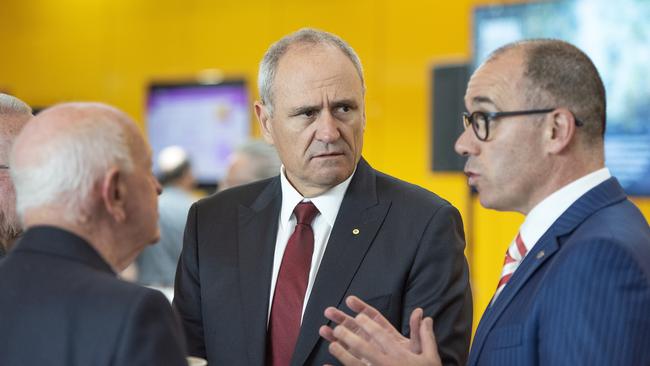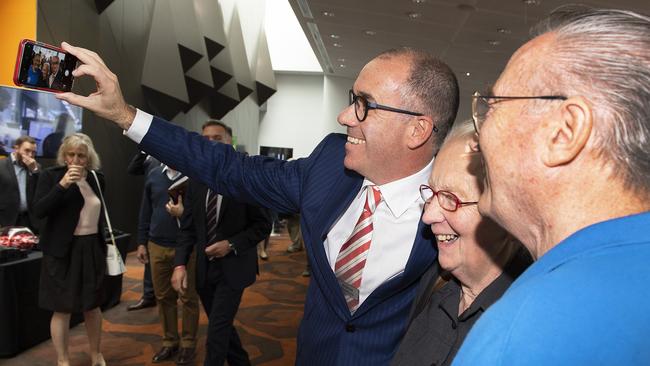NAB suffers record ‘first strike’ on remuneration report
A shareholder backlash over executive pay has resulted in a record “first strike” vote of over 88pc against NAB.

A shareholder backlash over inflated executive remuneration has resulted in a record “first strike” against National Australia Bank, with 88.1 per cent of proxies voted against the bank’s remuneration report.
The final vote will be known later today, but the overwhelming “no” vote is a record for a blue chip company.
An award of deferred shares to chief executive Andrew Thorburn was also defeated, with 63.6 of proxies voted against the resolution.
Chairman Ken Henry told shareholders the bank would “try again” to change the way it pays top executives.
He said NAB had already committed to an overhaul of the bank’s new remuneration framework, which created a single reward scheme and was only announced last September.
Dr Henry earlier told shareholders that about a third of “against” votes were due to the fact that bank has changed the structure of its pay scheme.
“No matter what happens here today, more than 80 per cent of the votes cast on our remuneration report will be ‘against’,” Dr Henry told shareholders.
Other factors included the quantum of remuneration, scheme design, and how the board has applied the scheme.
“No doubt, there are also many other reasons for shareholders registering a ‘no’ vote on the remuneration report this year,” Dr Henry said.
“The board is hearing loud and clear that our new scheme is not right. We tried, but we got it wrong,” he said.
“We are listening to you. We will try again.
“We remain determined to have a framework that meets the expectations of all our stakeholders.”
NAB follows rival Westpac in copping a first strike from unhappy shareholders, putting both at risk of a second strike and board spill in 2019.
ANZ was also poised to suffer a first strike this afternoon, with chairman David Gonski telling shareholders in Perth that 34 per cent of early votes had gone against the remuneration report.
A “first strike” occurs when a remuneration report receives a “no” vote of 25 per cent or more. If repeated at the next year’s AGM, it could trigger a board spill.
The massive proportion of shareholder votes against NAB’s remuneration report pips the previous record held by Harvey Norman, which had 75.8 per cent of votes cast against its pay report in 2014, according to the Australian Shareholders Association.
Last week Westpac was hit with more than 64 per cent of shareholder votes against its report, while in May this year, 62.2 per cent of votes were cast against AMP’s remuneration report.
As the “first strike” loomed, Dr Henry told shareholders that Mr Thorburn will return from his controversial period of extended leave “rested and recharged” to see through the bank’s transformation and beyond.
Dr Henry also confirmed a report in The Weekend Australianthat NAB would revamp its executive remuneration framework,
NAB previously announced it would dump short-term and long-term incentives and went to a single variable reward for the 2018 fiscal year, based on customer measures as well as financial outcomes.
The remuneration structure overhaul NAB announced in September cut the total level of CEO pay by 11 per cent and the aggregate for the leadership group, including Mr Thorburn, by 15 per cent and also introduced more non-financial metrics and measures including that 60 per cent of variable pay would comprise shares, deferred for at least four years.
But Dr Henry said today the bank would make further reforms to executive remuneration, saying the bank had got it wrong.
He said the bank would learn from feedback and consult with major shareholders.

Mr Thorburn, who will go on leave after today’s annual meeting, was paid $4.375 million for a year in which its full-year cash earnings fell 14.2 per cent and it owned up to poor customer treatment.
That was down from $6.448 million in the previous financial year, making his pay cut the largest among the big four bank chief executives in both percentage and absolute terms.
Dr Henry said Mr Thorburn will return from annual leave by February 1 to lead NAB’s response to the royal commission’s final report, and then take long service leave.
Nonetheless, he said Mr Thorburn’s future with NAB was secure. “We have a clear plan for NAB and remain confident in our future under the leadership of CEO Andrew Thorburn and an executive team of truly global quality,” Dr Henry said.
Dr Henry said he and Mr Thorburn had discussed the CEO’s decision earlier this year to take a month of long-term service leave in February.
The decision ignited speculation that Mr Thorburn might not return, given the bank’s poor performance in the royal commission.
However, Dr Henry said the extended leave was approved by NAB’s board.
“We are now 12 months into a three-year strategy to transform the bank and we look forward to Andrew returning from leave rested and recharged to see through the transformation — and beyond,” he said.
Dr Henry said he was “appalled” by the bank’s “poor regulatory compliance and poor outcomes for customers”.
He apologised, as did Mr Thorburn in his speech.
“I understand that many of you are upset by what you have seen and heard — and I understand why you are upset,” the chairman said.
“The board accepts responsibility for these things. We are sorry.”
During the meeting, Mr Thorburn said home loan applications had fallen by 7 per cent over the last six months, as concerns over falling prices and rising interest rates take hold.
The NAB chief said he still expected housing credit to grow by 3-4 per cent, with the slowdown and a period of stability potentially good for the economy.
Mr Thorburn said a tightening of credit policies as a result of the royal commission, including tighter scrutiny of income and expenses, had also slowed down the process of applying for home loans.
“But it won’t stay like that,” he said.
Dr Henry claimed credit for convincing the three other major banks to support a royal commission.
The chairman said he and Mr Thorburn had come to the view in 2017 that a royal commission was the appropriate forum for customers to air their grievances.
“I tell you here today we did,” Dr Henry said. “And I’m pleased to say we did.”
He asked how anyone could now believe that the royal commission was not warranted.
Dr Henry declined to comment on the NSW police fraud investigation into NAB’s dealings with Human Group, the external travel agency that provided more than $100m in services to the bank.
The chairman said the police had asked NAB not to comment publicly on the issue.
However, he assured shareholders that the issue would not happen again.
Mr Thorburn said processes had been changed so that the bank’s procurement team handled all such tenders.




To join the conversation, please log in. Don't have an account? Register
Join the conversation, you are commenting as Logout